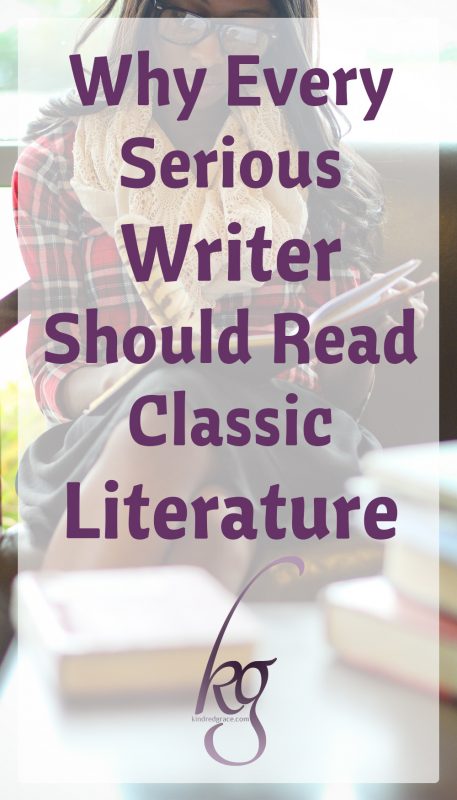5 Reasons Why Every Serious Writer Should Read Classic Literature
My grandma’s TV sat on the floor, with me right in front of it. As a kid, I flipped channels for hours. And every so often, an old movie channel would show a stiff-legged monster with outstretched arms, staggering toward a screaming woman.
Flip. Not interested.
For whatever reason, the story of Frankenstein has never held much allure for me, even as an adult. The same is true for most Gothic literature.
Stormy nights.
Empty coffins.
Wily ghosts.
No thanks.
So when I received the required reading list for this year’s English class, I saw the title Frankenstein—with its green-faced cover—and sighed. Okay. Whatever.
Within a few pages, however, I was surprised, if nothing else, by the use of language. My preconceptions of the story have been mired in movie-making, not story-writing.
Written in the early 1800s, the language is steeped in rich vocabulary and eloquent phrasing. I’m still not a fan of the story, but its use of language makes it worthwhile reading. In fact, I’ve revisited a number of classics in recent months: Anna Karenina by Leo Tolstoy, Jane Eyre by Charlotte Bronte, and A Tale of Two Cities by Charles Dickens. They all have something in common too. A lush tapestry of language.
After reading these classics, I realized how much I’ve missed reading good books. For the past few years, I’ve enjoyed the world of blogging and all the wonderful people I’ve met through online writing. Finding fabulous writers who share their words—for free!—through blogs has been a joy.
But there’s something in classic literature that can’t be found other places. And I need to remind myself not to neglect the heritage of literature we possess. Taking the time to read classic literature enriches us as writers in countless ways. Here are the top five reasons why every serious writer should read at least a few classics each year.
1. Classic literature deepens our reservoir of words.
Our vocabulary is shrinking. The shorthand we see in text messages and other social media venues isn’t entirely to blame either. People, in general, are reading less. And the less we read, the less exposure we have to words. Not only is it a matter of how much we read, it’s also a matter of what we read. If we’re only reading the words we find online, we’ll likely miss out on the oceans of words found in classic novels.
2. Classic literature expands our usage of phraseology and syntax.
The most basic sentence formation is SUBJECT-VERB-OBJECT (S-V-O). Since a blog post is supposed to be succinct, online writers usually prefer sentence structures that favor expediency. Yes, simple sentence constructions are good for clarity. And clarity trumps complexity every time. But too many S-V-O sentences in a row will create monotony, and I’ve never met a reader who enjoys a monotonous writing style. When we read classic literature, we gain access to a greater variety of sentence types, which will invariably show up in our own writing.
3. Classic literature improves our grammar.
Did the rules of grammar bore you in high school? Don’t worry. You’re not alone. Rules bore everyone. The best way to learn good grammar is to immerse ourselves in good grammar. When we read classic literature, we’re reading highly complex language patterns that are grammatically sophisticated. While we’re having fun following the storyline, our brains are absorbing the grammar. It’s a win-win.
4. Classic literature expands our knowledge base for literary allusions.
Knowledge builds upon knowledge. And the more we read, the more we enlarge our internal library of references. For example: “To read, or not to read, that is the question.” We know this is an allusion—a spin on the most famous line in Shakespeare’s Hamlet: “To be, or not to be, that is the question.” Writers are wise to enhance their writing with subtle references to the great literary works we share. These references become bridges that bond humanity across time and space.
5. Classic literature refines our thinking.
When we read classic literature, we’re exercising our brains. We’re actually giving our brains a really good workout. This keeps our memory sharp. And it helps us gain precision with diction. A bigger vocabulary is useless unless we understand the nuances of individual words. Sometimes a thesaurus can be a writer’s worst enemy. Because synonyms are not always interchangeable. Every word possesses a distinct meaning, and the best writers value precision in language. Writers must be able to articulate truth with beauty and clarity. And writers can only achieve this in their writing when they’ve invested the time necessary to refine their thinking through much reading and contemplating.
It’s hard enough to find time to write, let alone find time to read. But there’s no such thing as a writer who’s not a reader. Reading good books is an indispensable part of developing as a writer.
As writers, we may wish for a mentor who could help us become better writers. But the truth is, countless mentors are waiting to be picked. So pick up a classic. Enjoy the story. Then reread it for the sheer delight of observing the way the story is told. Study the development of the plot. Notice the variations of syntax. Keep a running list of new-to-you words. Follow the weaving of narration, description, and dialogue.
Read a classic. Or two. Or three. And be inspired. I promise it’s a much better way to spend our time as writers than watching reruns of old movies on TV.
Photo Credit: Farmgirl in Flipflops



Five great reasons to pick up a classic! And the frosting on the cake is a good story line.
Though I love memoirs and inspirational reading, without the occasional grab-the-mind-and throw-away-the-clock novel, I forget the power of words to transport us.
Thanks for the challenge, Denise!
Classics have always bored me to tears…except Wuthering Heights. Although I am absolutely positive I would LOVE the story, I seem to only be able to get to around the middle before I put it down and pick up something else. I guess it just the thought has been in my head for so long that I would hate a Classic.
This post made me want to go pick up a few and get my brain in shape! Thanks, Denise, you’re awesome.